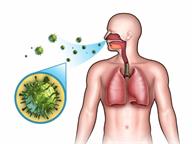ThisisPatientEngagementcontent
COVID-19
Learn more about our Patient Engagement products now! Turn your patients into active participants in their healthcare by giving them easy access to the same evidence-based information you trust – but delivered in an easy-to-understand format.

COVID-19 is caused by a virus. This virus may be in the air as droplets or on surfaces. It can spread from an infected person when they cough, sneeze, speak, sing, or breathe.
You may become infected if:Sometimes, COVID-19 does not cause symptoms.
COVID-19 can be diagnosed with tests done in the lab or at home. Fluid from your nose, mouth, or lungs will be used to check for the virus.
If you have symptoms and are at risk of getting very sick, you may be given a medicine that fights viruses. This medicine is called an antiviral.
If you think you have COVID-19 or have been around someone who has it, stay home and away from other people as told by your provider or health officials.
This information is not intended to replace advice given to you by your health care provider. Make sure you discuss any questions you have with your health care provider.
Cookies are used by this site. To decline or learn more, visit our cookie notice.
Copyright © 2025 Elsevier, its licensors, and contributors. All rights are reserved, including those for text and data mining, AI training, and similar technologies.